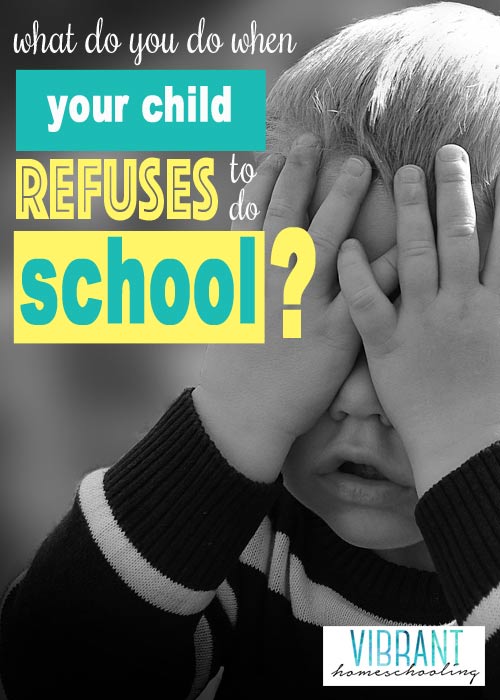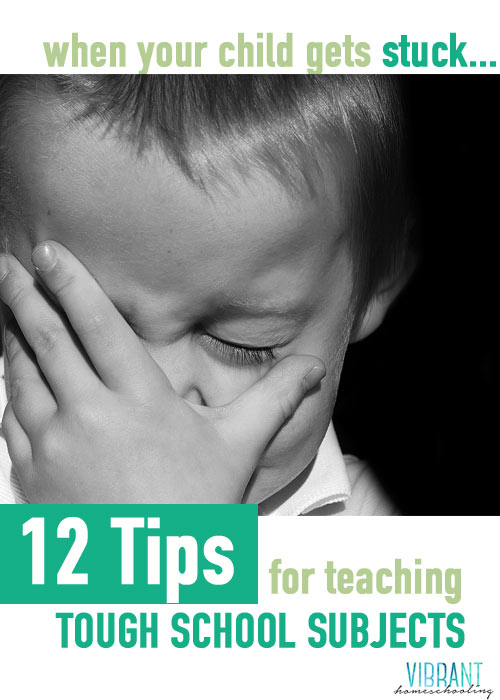What do you do when your child hates school? That was my painful reality last year at this time.
I’m sharing my story here because if you’ve never experienced this, chances are you will encounter it sometime in your tenure as a homeschool mom.
Here’s what we went through; how our family navigated through this difficult time; and the hope we discovered along the way.
In late fall of 2014, it seemed like I woke up every morning with a pounding headache.
I would get out of bed, turn on the shower and stand in the warm spray, praying again and again for relief from the pain.
And although the hot steam would relax my muscles somewhat, the shower’s steam couldn’t remove the real source of the pain: the mounting anger and frustration I had toward my eleven-year-old.
My oldest child suddenly hated school and had made it his life’s mission to fight me on anything education-related. Which not only made him nearly impossible to teach, it greatly limited my ability to help my other three children.
Like a donkey that had set in his heels and refused to move, my son’s defiance and uncooperative spirit kept him locked into this mindset: I will not do school, no matter what you say.
And this spirit was not only destroying him, but causing our entire family to suffer.
Being Real About the Pain
Why was I really angry about this—so much so that my body was showing physical manifestations of the stress?
I was surprised and saddened by my answers.
First, I felt like a complete and utter failure, both as a teacher and as a mom (which is a hefty combination). Why couldn’t I help him through this? What was I doing wrong? What did I need to change? Things had always worked so well up to this point and I didn’t understand why they suddenly weren’t.
Second, I felt helpless and trapped by something completely out of my control. What was I supposed to do with this situation? Ignore it? That was impossible since it was in my face every single day. Let him not do any school? No, he had already fallen behind in math. And besides, I didn’t want him to learn that if things were too hard than he should just quit.
So was learning to persevere the real issue for him? Or did he need a curriculum switch? Perhaps it was time to consider different schooling options? My heart was torn as the battles raged on each day.
In addition, my soul was grieved and concerned for my son. Yes, I knew embracing difficulties was harder because of his diagnosis. And while we were always trying to be sensitive to this, we also tried to equally balance his need to be prepared for the “real world.”
My husband and I believe that choosing to embrace responsibility (whether or not that responsibility is our “favorite”) is essential to all areas of life success. If I did not push him to his greatest potential at this critical juncture, would he learn in the future to simply give up if things get too hard or if they weren’t his “first choice”?
Lastly, I hated how much energy this struggle took from our entire family’s day. I was emotionally spent after each encounter with my son and felt like I had nothing left to give my other kids. In fact, a friend of mine noted that since I was giving 90 percent of my time, energy and attention to my oldest son, I was trying to parent my other three kids on that measly 10 percent.
Something needed to change. But what? And how?
Steps to Discovering Solutions
How could we get over this hump when my husband and I felt like we’d exhausted all solutions?
We began by asking some basic questions.
First, we asked, “What can we change?”
Answer #1: We could change the curriculum.
I wasn’t sold on this one. Our curriculum was solid (click here to see our favorites for free resources, and those for history/geography, science, and math). I was willing to change (and have changed things up on multiple occasions for our kids).
But I sensed that it wasn’t the fact that he didn’t like this style of learning, but that instead he just didn’t want to do anything related to school. This became especially evident when we allowed him to choose different ways to learn the material (and he still fought us). When we noticed that we also got similar pushback around doing chores, it was pretty clear that he didn’t want to do anything related to hard work.
And now that he was in 6th grade, his educational needs required something more rigorous in order to prepare him for middle school, high school and eventually college. I couldn’t let him slip by.
Answer #2: We could change how we did school (in terms of daily rhythms and location).
We played with this one for a while. We wondered if perhaps (as a child approaching puberty) he needed additional sleep? So we let him start school a little later. The problem was that he didn’t sleep later! Asking him to stay in bed so that he could sleep longer actually became a new point of contention.
Another option we tried was to allow him to do his schoolwork in different locations around the house (and even outside on our patio). We thought giving him additional freedoms might warm him up to the idea of learning, but no dice. This just distracted him further from his tasks. Now he was wasting time being distracted and pitching a fit about the school work. Super fun, right?
Answer #3: We could move him to a different schooling option.
This was the biggest and most drastic of the options, but as the other alternatives continued to not pan out, we began to look more seriously at possibly putting him in a traditional school.
We knew this wasn’t a decision to make lightly. We’d planned to homeschool even before we married! However, we decided that our son’s best interest was far more important than our need to force the homeschooling mold if it was no longer a good fit. We needed to help our son through this and, therefore, all schooling options were on the table.
Next, we asked “What can we not change?”
Ultimately, that came down to one answer: We couldn't change his behavior.
We could pray about it (which we did daily and fervently) and we could talk to him about it. And, yes, these are powerful.
But ultimately, we realized that our son is in charge of his own decisions. He has the power to respond differently to school and to embrace the responsibility… or not. This was a very hard pill for to swallow because it reminded us of how powerless we parents are when it comes to helping our kids grow into who they need to be.
We couldn’t do the maturing for him or change how he interacted with us.
However, we could control how we interacted with him:
- We could continue to do our best to stay calm and to not respond in anger.
- We could continue to pray regularly for him and ask for specific guidance.
- We could continue to stay united as a couple in helping him through this.
- We could accept this circumstance with joy and believe with all our hearts that God was going to use it for our good.
So that’s what we did.
Some books that were helpful to us during this time:
Other Survival Tactics for the Battle
As the main teacher and caretaker of our children, I dealt with the brunt of my son’s challenges during this season. And as I felt the stress rising (and sensed that the situation was probably not going to be short-term), I began to develop personal strategies for survival.
For one thing, I made sure that I was not only praying for my son but for myself, the other kids and for our marriage to remain strong.
And, because most days I was mentally exhausted by 9:00 a.m., I took time each day for a 20 minute or 1.5 hour nap. I tried to make time for basic stress relief and soul care.
Third, my husband and I shared with our pastor (and a handful of other families in our church) about the utter hell our family was enduring. We trusted them to pray us through on those moments when we had nothing left.
I also asked myself, “What other things can I let go of in my life so that I can focus on being triumphant through this?” How I can get off the merry-go-round and simplify things?
Lastly, I chose to believe with all of my heart that good would come from all of this pain. I chose to believe verses like Psalm 126:5 that say: “Those who sow with tears will reap with songs of joy.”
My Encouragement to You
If you have a child that hates school, I want to let you know that you’re not the only one that has gone through this. If we were having coffee together and you were sharing your story with me, I’d be crying alongside you because I understand the deep,debilitating pain.
Friend, can I encourage you to assess the source of the defiance; to be honest with yourself about what you’re experiencing as a result; and then develop some tangible solutions based on the questions, “What can I change?” and “What can’t I change?”
Be real with yourself and others, and hold on tight to God through the battle. Most of all, ask him daily for specific wisdom on how to parent—and homeschool—through this challenge. Let Him lead you step-by-step to victory and to the best solution for your family in this season.
Other posts about difficult homeschool issues:
What Do You Do When Your Child Refuses to Do School?
When Your Child Gets Stuck: 12 Tips for Teaching a Tough School Subject
Your Turn:
Have you been on the very difficult “my child hates school” road before? If so, what advice do you have to someone else who may be struggling?
Linking up at these parties: Whimsy Wednesday, What to Read Wednesday, Hearts for Home, Home Matters, Momma Told Me, Family Fun Friday










